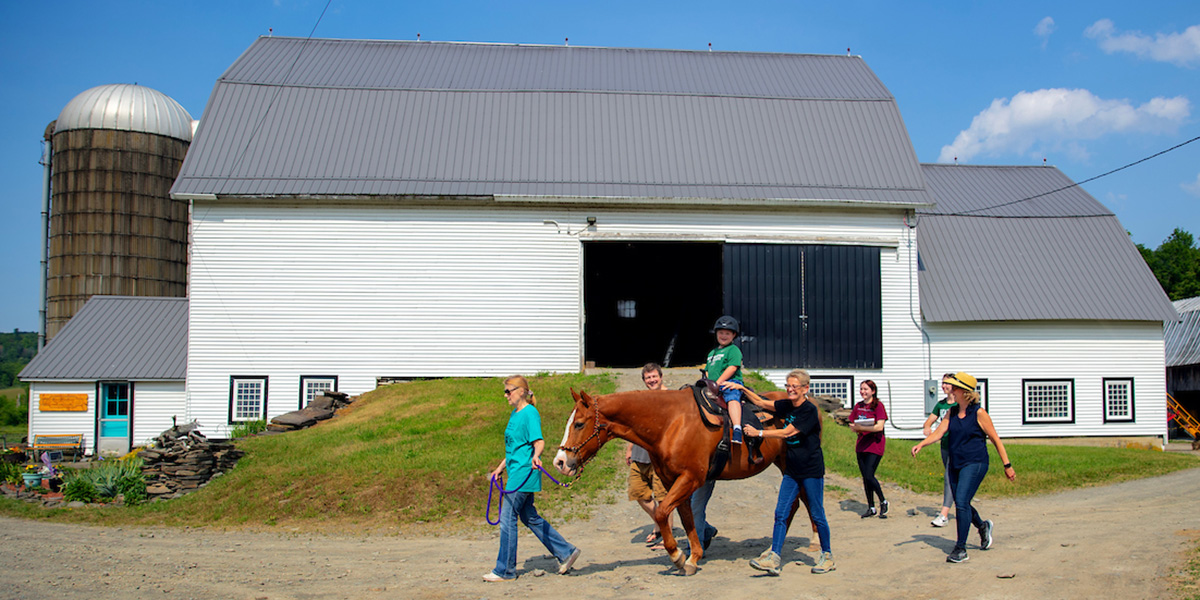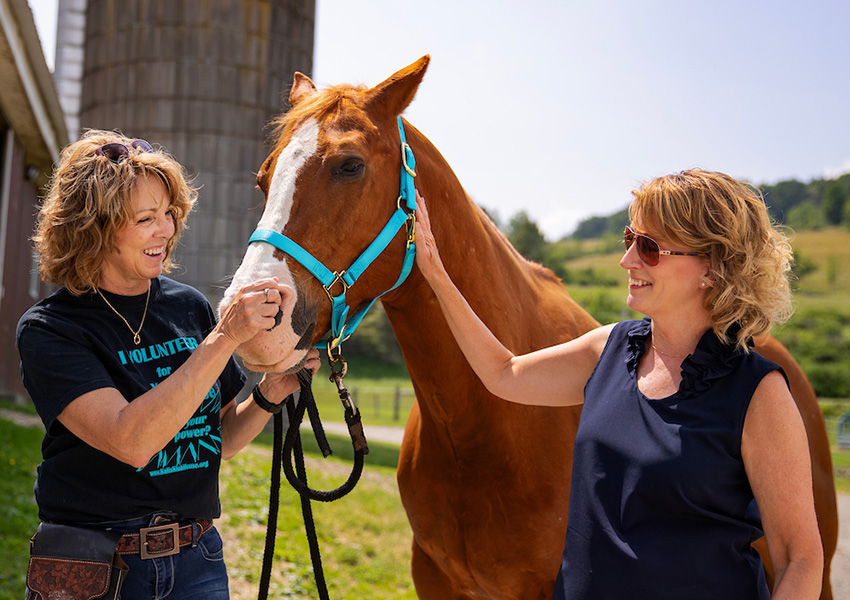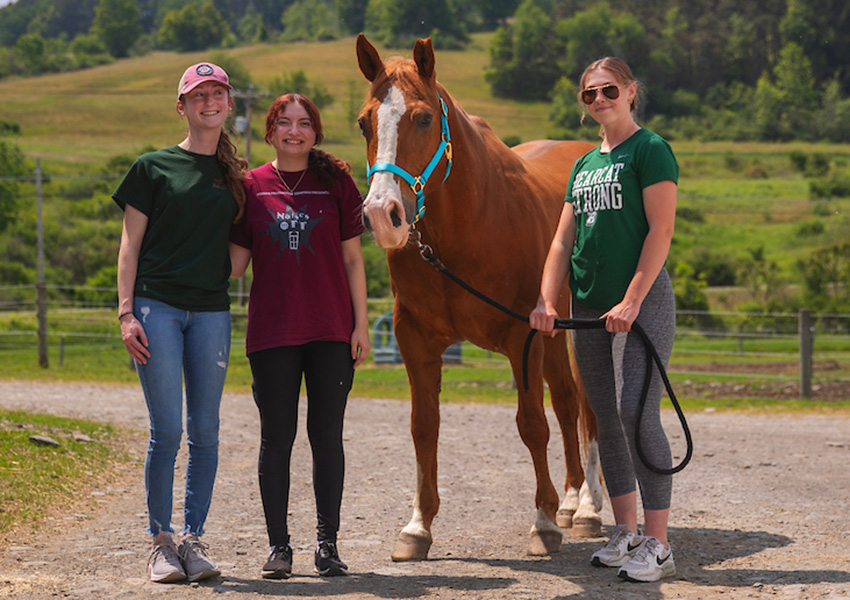Binghamton University speech and language therapists use horses to help kids communicate
Decker College collaborates with Kali's Klubhouse, using equine therapy to help kids develop speech and language skills

Interacting with animals can improve mood, stress levels and feelings of well-being. Being around animals simply makes us feel better.
Partnering humans with animals in therapeutic settings is an evidence-based mental and physical healthcare practice, with positive patient outcomes for all ages. Compelling anecdotal and clinical evidence supports the healing power of the human-animal bond.
The Kali’s Klubhouse: iTalk with Horses program is a community partnership through Decker College of Nursing and Health Sciences. Tina Caswell, director of clinical education and clinical associate professor in the Division of Speech and Language Pathology, began the program about 10 years ago as a graduate externship during her time at Ithaca College.
Caswell brainstormed the idea when one of her clients, an 8-year-old boy, began horse-riding lessons. She arranged to work with him during one of the sessions.
“I was walking along with him, and we were just talking using his communication device, and he was having a blast,” Caswell recalls. “He was very motivated and engaged, and I thought, ‘Why am I not doing this more?’ And then, I met Linda.”
Linda Fargnoli owns Fargnoli Farms, a horse-boarding facility in Apalachin, N.Y., and is executive director of Kali’s Klubhouse, which provides equine-assisted therapy. She is certified in equine-assisted learning and equine experiential education and trained to help facilitate learning outcomes.
Hippotherapy as a treatment strategy
Most of the horses at Kali’s Klubhouse are donated and in what Fargnoli calls their “second careers.” She and the volunteers work with the horses to ensure they are comfortable in their new roles.
While hippotherapy (hippos is Greek for horse) is considered a therapeutic technique rather than a type of therapy, Fargnoli says the horses are not tools but partners in this work. Respect and consideration are given to their physical, mental and emotional well-being.
“We make sure the horses actually like what they are doing and that this is fun for them, too,” she says.
The six-week program takes place annually in May and June. It is entirely scholarship based and funded primarily through private donations, grants and fundraising activities. Last year, the program received operational funds for two years from the Stephen David Ross University and Community Projects Fund.
The program serves children from Broome and Tioga counties, and this year’s participants ranged from 2 to 19 years old. Some children are nonverbal or minimally verbal with diagnoses that include cerebral palsy, autism spectrum disorder and Down syndrome.
Some children have primary or additional diagnoses, such as apraxia of speech, a neurological condition where the brain has difficulty coordinating the complex oral movements needed to create sounds and syllables and turn words into phrases.
iTalk with Horses is so popular that it’s filled every year just by word of mouth.
“Parents are looking for alternative therapies to encourage speech and language in their children, and this is something fun,” Caswell says. “It doesn’t feel like work to the child. We’re outside in this beautiful, motivating environment, and it’s a wonderful opportunity to promote speech and language development.”
One program, many benefits
Caswell meets with each family before the program starts to form a baseline assessment and better understand the child’s diagnoses and goals.
The program incorporates augmentative and alternative communication (AAC) strategies to help clients develop speech, language and cognitive skills. AAC devices range from “low-tech” picture communication boards to “high-tech” iPads or tablets programmed with speech-assisting software. The software employs three methodologies: single-meaning images, alphabet-based keys and semantic compaction, where users construct language through sequencing icons or pictures.
The Decker speech and language pathology team includes Clinical Instructor Cassandra Natali, who has worked with Caswell and the equine therapy program since 2015 and was originally her student at Ithaca College.
In addition to a speech-language pathologist, two or more volunteer equine experts and a speech-language pathology intern accompany each rider. During the 30-minute ride, the pathologist engages the child, eliciting responses to questions or prompts. For instance, the therapist may ask the child to choose between two options — yes or no, left or right — or select from multiple alternatives. The child may respond verbally or by tapping an image or word on the device screen.
The program is also an excellent experiential opportunity for undergraduate interns from Decker’s speech and hearing science minor. This year, interns include linguistics major Emma Colling, psychology major Kylie Browning and English major Alessandra Antonacci, all of whom plan to pursue graduate degrees in speech and language pathology.
“I didn’t know much about speech pathology beyond the school setting until my grandmother suffered a small stroke, and she worked with a speech pathologist who helped her immensely,” Colling says. “When I learned that Binghamton offered this minor, I immediately signed up. And I just fell in love with it.”
Antonacci was intrigued after learning about Caswell’s work with Kali’s Klubhouse during the spring Speech-Language Association meeting. When she heard about the summer internship, she jumped at the opportunity.
“It’s been such a rewarding experience watching the kids progress and seeing their confidence increase as well,” she says. “Several kids wouldn’t even get on a horse the first day. Now we can’t get them off.”
Browning, the only student with previous experience around horses, found the internship a perfect fit: “I love the [speech pathology] program and the fact that the internship involves horses — it combines two of my favorite things.”
Horses helping kids
Pam Carpenter credits the program with helping her 7-year-old son, Daniel, who, in addition to Down syndrome, has a speech apraxia diagnosis and is primarily nonverbal. She believes he can better regulate behaviors stemming from his struggle to communicate.
“We’ve been seeing some social behaviors happening this year because of Danny’s frustration,” Carpenter says. “He has much more going on in his head than he can communicate and is understandably frustrated with that. We were looking for alternative therapies to try, and luckily were able to fill the last slot in this program.”
Carpenter says that practicing in a novel, nonacademic setting has helped her son see his AAC device as less of an educational tool and more of an extension of his voice.
“It’s really been helping with his speech, cognitive and social skills. He feels more empowered and has even started using his device to construct sentences. And it started with ‘Dan ride on horse.’”
Sasha Morris grew up around horses, but for her 4-year-old son Nathaniel, who has apraxia of speech and dyspraxia, this was his first time on a horse. Morris learned about the program from Nathaniel’s school speech and language therapist and found the experience “magical.”
“Initially, Nathaniel was hesitant to get up on the horse, but now he loves it,” she says. “He just starts chatting away and asking questions about all kinds of things. He is much more verbal and curious about what’s happening around him when he is on the horse.”
Equine magic
Backed by clinical evidence, the human-horse connection in the iTalk with Horses program and other therapeutic settings has been shown to be innovative and effective. Caswell has been collecting that data and presenting at national and state conferences promoting the efficacy of alternative therapies in speech-language pathology.
Caswell, Fargnoli and the volunteers put in exceptional effort and hard work, but the horses are undeniably the program’s shining stars. Despite their imposing size, the friendly and patient horses have a calming presence that creates a peaceful therapeutic environment. The gentle rolling motion of the horse also has a healing effect on the young riders.
“There’s a genuine connection with the horses,” Caswell says, “and that special bond can create real breakthroughs and improve many other aspects of their lives.”


